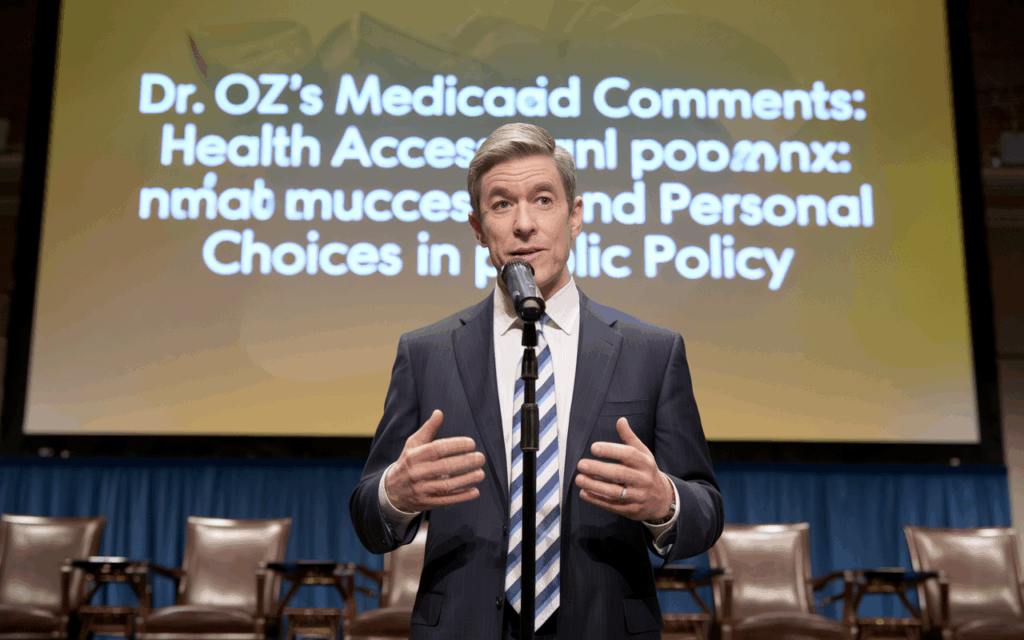Dr. Oz's Controversial Stance on Medicaid: Is Healthy Living the Key? 🥦🍰
In a recent statement that's stirred quite the debate, Dr. Mehmet Oz, the former heart surgeon and current Administrator of the Centers for Medicare & Medicaid Services, suggested that Americans may have access to Medicaid as long as they "stay healthy" and "avoid cake." 🧁 This remark arose amidst discussions about the new legislation under the Trump administration expected to kick millions off Medicaid, sparking widespread concern over the future of health care for low-income and disabled Americans.
According to reports, the new policy nicknamed the "Big Beautiful Bill," seeks to introduce stringent work requirements for Medicaid recipients, threatening to disenfranchise around 15 million people. This means that not only do individuals need to be employed or enrolled in school, but they also must be careful about their income—not exceeding certain limits which would lead to disqualification.
Oz, during his appearance on Fox Business, stated, “But you’ve got to stay healthy as well. Be vital. Do the most you can do to really live up to your God-given potential to live a full and healthy life. Don’t eat carrot cake.” His comments have drawn laughable reactions but also serious queries regarding the implications of linking health insurance to personal health choices. 🤔
The mention of avoiding cake might have been made in jest, but it brings into question the broader issue of responsibility and health in public policy. Many have criticized Oz's comments as being out of touch with the realities faced by those who rely on Medicaid. Senator Elizabeth Warren chimed in, asserting the absurdity of suggesting that 17 million people are going to lose their health insurance due to the Trump administration’s decisions, with “Dr. Oz’s advice is ‘don’t eat carrot cake’.”
It's important to recognize that access to healthcare should not be conditioned on an individual's personal lifestyle choices. Many individuals facing economic hardship eat what they can afford, often compromising on nutrition, which is not a reflection of personal failure but of systemic issues. 🏥
Oz's intentions may stem from a genuine public health initiative, seeking to promote a healthier lifestyle among Americans. However, linking healthcare access to personal health choices risks stigmatizing those who are already vulnerable. Healthier options aren't just about willpower; they also revolve around availability and affordability.
Transforming healthcare into a more productive industry—as Oz suggests—should not come at the expense of the most vulnerable segments of our society. Instead, it should strive to enhance support systems allowing everyone access regardless of their health status or income bracket.
In conclusion, while advocating for healthier living is a positive goal, equating it with insurance eligibility poses numerous ethical challenges. The health and well-being of Americans should be a bipartisan concern, one that doesn't marginalize those who find themselves in difficult situations. 🍏 Let’s pave the way for an inclusive approach that grants everyone the healthcare access they deserve without added conditions or stigma.
What are your thoughts on this topic? Do you agree with Dr. Oz's perspective, or do you think there should be broader considerations regarding healthcare access? Let’s hear it in the comments! 💬
[#Medicaid #HealthCareDebate]

More Stories
Exciting News: The Summer I Turned Pretty is Becoming a Movie
Reflecting on Robert Redford’s Legacy of Integrity and Artistry
Sara Rivers Appeals Dismissal of $60 Million Lawsuit Against Sean Combs: A Fight for Justice in the Entertainment Industry